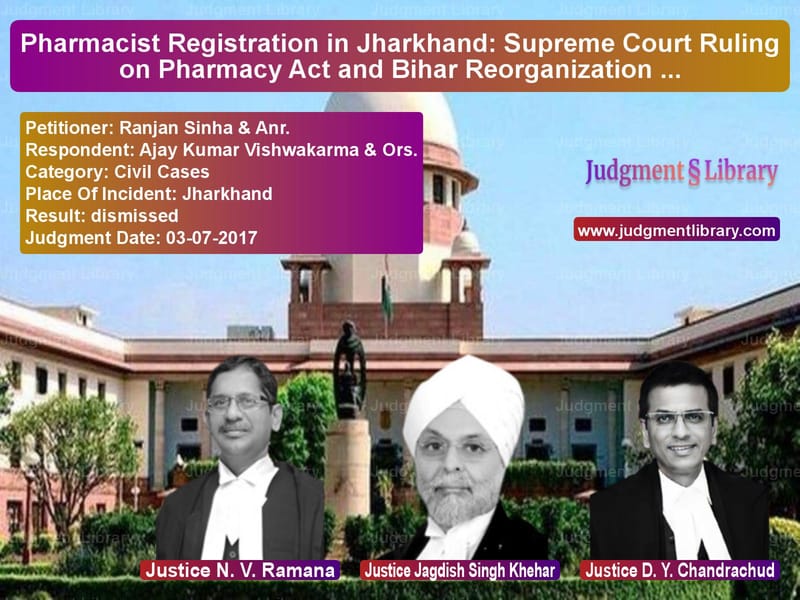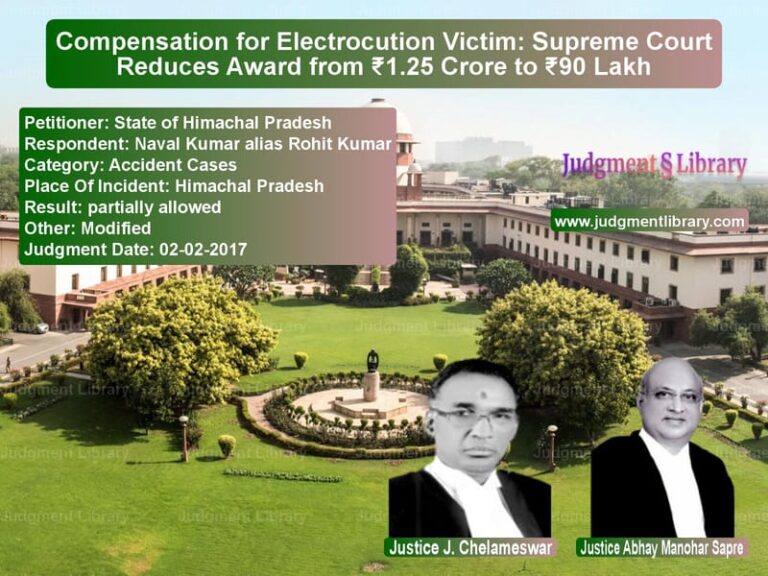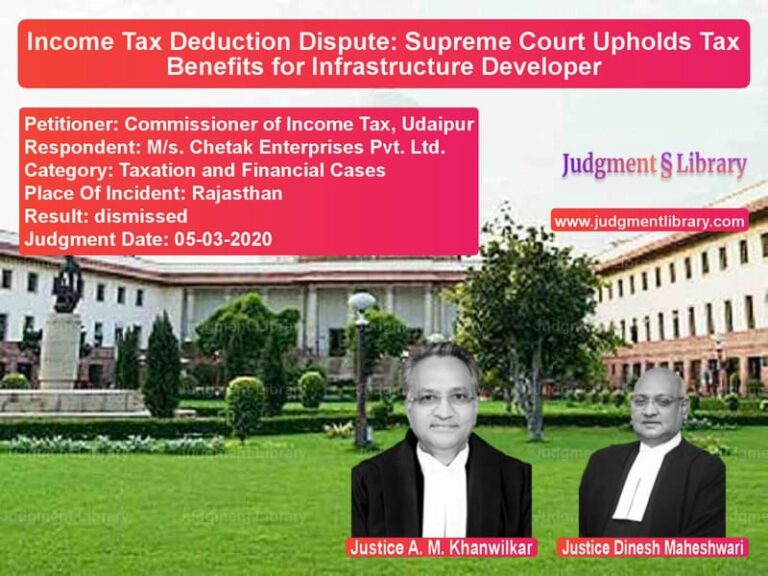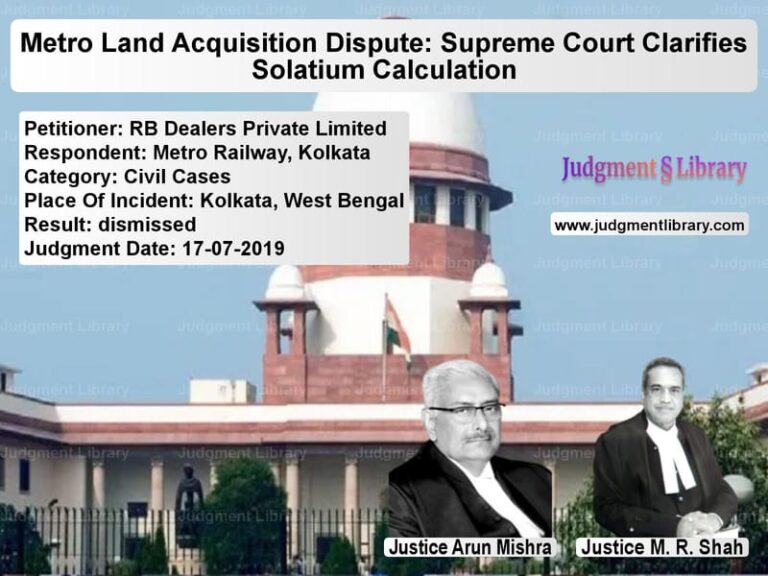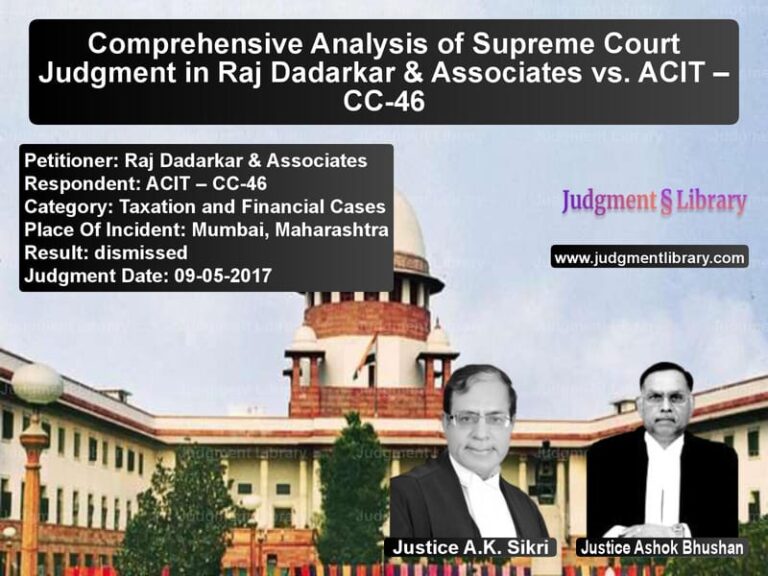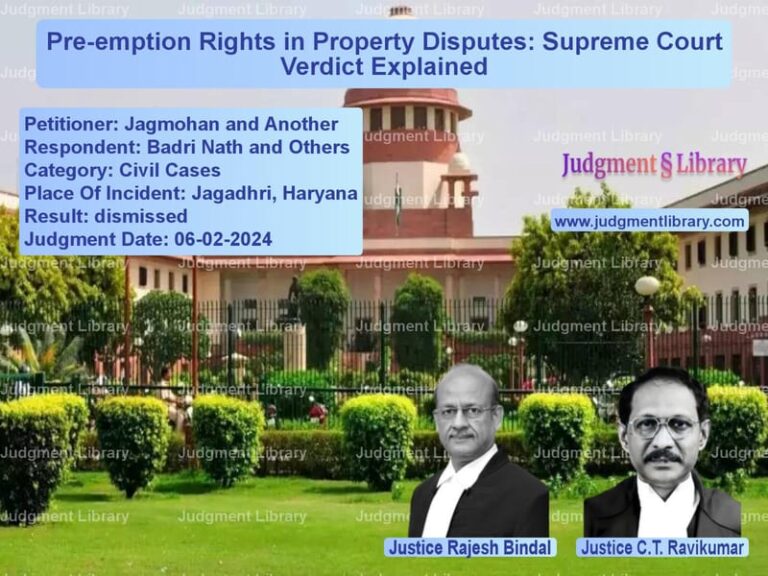Pharmacist Registration in Jharkhand: Supreme Court Ruling on Pharmacy Act and Bihar Reorganization Act
The case of Ranjan Sinha & Anr. vs. Ajay Kumar Vishwakarma & Ors. brought into focus the legal complications that arose following the bifurcation of Bihar and the creation of the state of Jharkhand in 2000. The dispute centered on whether Jharkhand had the authority to prepare a new First Register of Pharmacists under the Pharmacy Act, 1948, or whether it was bound by the register previously maintained by Bihar.
Pharmacy registration plays a crucial role in regulating the profession and ensuring that only qualified individuals dispense medicines. The Pharmacy Act, 1948, lays down the qualifications and procedures for registration of pharmacists in various states. However, after Jharkhand’s formation, confusion arose regarding the validity of Bihar’s First Register and whether Jharkhand could create a new register from scratch. This dispute led to litigation that culminated in a landmark judgment by the Supreme Court of India.
Background of the Case
The Pharmacy Act, 1948, applies to all states in India and mandates that every state maintain a register of qualified pharmacists. Before the bifurcation of Bihar, the State Pharmacy Council of Bihar had already prepared the First Register of Pharmacists under Section 30 of the Act. This register included the names of individuals who were qualified under the provisions of the Act at that time.
After the creation of Jharkhand, the state government decided to establish its own Registration Tribunal under Section 30 of the Pharmacy Act, 1948. A notification dated 14.01.2002 invited applications from individuals seeking registration as pharmacists in Jharkhand. However, this move was challenged by diploma-holding pharmacists who argued that the First Register already existed and that Jharkhand could not legally create another one. They contended that new registrations should only be conducted under Section 32 of the Pharmacy Act, which mandates adherence to the Education Regulations.
Petitioners’ Arguments
The petitioners, who were diploma holders in pharmacy, challenged the notification issued by the Jharkhand government, arguing that:
- The First Register for pharmacists had already been prepared by Bihar before Jharkhand’s formation.
- Section 84 and 85 of the Bihar Reorganization Act, 2000 (BROA), ensured that all laws applicable to Bihar before its bifurcation remained in force in Jharkhand.
- Jharkhand was legally bound by Bihar’s First Register and could not prepare a new register.
- Any subsequent registration must be conducted under Section 32 of the Pharmacy Act, which requires adherence to the Education Regulations.
Respondents’ Arguments
The State of Jharkhand, represented by Senior Counsel Ajit Kumar Sinha, defended its decision, arguing that:
- As a newly formed state, Jharkhand had the right to prepare its own First Register under Section 30 of the Pharmacy Act.
- The creation of a Registration Tribunal was in accordance with the legislative provisions.
- The High Court had erred in interpreting the Pharmacy Act and the Bihar Reorganization Act.
- The Education Regulations did not override the fundamental right of a newly formed state to regulate its own affairs.
Supreme Court’s Observations and Verdict
Justice N. V. Ramana, writing for the bench, analyzed the implications of the Bihar Reorganization Act, 2000 (BROA), and the Pharmacy Act, 1948. The Supreme Court held that:
- Under Section 84 of the BROA, all laws applicable to Bihar before the bifurcation remained applicable to Jharkhand unless explicitly repealed or amended.
- Since the First Register had already been prepared and published by Bihar, it must be deemed as the First Register for Jharkhand as well.
- Subsequent registrations should be carried out under Section 32, ensuring adherence to Education Regulations.
The Court ruled that Jharkhand did not have the right to prepare a new First Register and that the pharmacists already registered in Bihar’s First Register, whose residence fell within Jharkhand, should be deemed registered in Jharkhand. The appeal was dismissed.
Key Legal Findings
The Supreme Court’s judgment clarified several important legal principles:
- Continuity of Laws: The Court reaffirmed that when a new state is created through reorganization, existing laws remain in force unless explicitly modified or repealed by a competent authority.
- Scope of Pharmacy Act, 1948: The Act provides for both initial and subsequent registration of pharmacists. The initial registration (First Register) applies only when a state is newly covered under the Act, whereas subsequent registrations must adhere to Education Regulations.
- Role of Education Regulations: The Court emphasized that after the enactment of Education Regulations, only those meeting the prescribed qualifications can be registered as pharmacists.
- Validity of First Register: The First Register prepared by Bihar was deemed to be valid for Jharkhand, negating the need for a separate register.
Conclusion
The Supreme Court’s decision in this case has far-reaching implications for legal disputes arising from state reorganizations. It establishes that laws applicable to a parent state continue to apply to the newly formed state unless explicitly changed. The ruling ensures that pharmacists already registered in Bihar’s First Register automatically qualify in Jharkhand, avoiding unnecessary duplication of registration processes.
This judgment reinforces the principle that new states must respect the legal frameworks they inherit upon formation. It also upholds the importance of adhering to Education Regulations in pharmacy registrations, ensuring that the public receives medicines dispensed only by qualified professionals.
Don’t miss out on the full details! Download the complete judgment in PDF format below and gain valuable insights instantly!
Download Judgment: Ranjan Sinha & Anr. vs Ajay Kumar Vishwakar Supreme Court of India Judgment Dated 03-07-2017.pdf
Direct Downlaod Judgment: Direct downlaod this Judgment
See all petitions in Contract Disputes
See all petitions in Public Sector Employees
See all petitions in Judgment by N.V. Ramana
See all petitions in Judgment by Jagdish Singh Khehar
See all petitions in Judgment by Dhananjaya Y Chandrachud
See all petitions in dismissed
See all petitions in supreme court of India judgments July 2017
See all petitions in 2017 judgments
See all posts in Civil Cases Category
See all allowed petitions in Civil Cases Category
See all Dismissed petitions in Civil Cases Category
See all partially allowed petitions in Civil Cases Category

